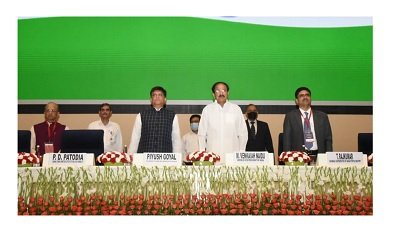Soil health needs our urgent attention: VP
According to M Venkaiah Naidu, organic farming is the way forward
The Vice President, M Venkaiah Naidu underlined the importance of organic farming for sustainable and stable development. He said that natural resources such as soil and water are not unlimited and the future of mankind depends on their conservation.
Addressing a gathering after releasing the book titled Bhumi Suposhan (meaning – soil nutrition) published by Akshay Krishi Parivar at Upa-Rashtrapati Nivas, the Vice President expressed his concern over the degradation of soil due to the overuse of pesticides and fertilisers and stressed the need for creating awareness on this important issue. He also said that unchecked extraction of groundwater is fast depleting our groundwater table leading to a reduction in moisture content in the soil, thus turning fertile land into barren land.
Listing out various benefits of organic farming, the Vice President opined that it not only improves soil health but also reduces farmers’ input costs. Locally available resources such as cow dung and waste organic matter can be used to prepare low-cost organic manure, thus increasing farmers’ income.
Acknowledging Green Revolution’s role in ensuring the country’s food security, Naidu highlighted some of its unintended consequences such as the uncontrolled use of pesticides. Appreciating various governmental and individual efforts for soil conservation, he said the network of laboratories for soil testing is being strengthened and natural farming is being promoted in ecologically sensitive areas such as villages adjacent to the river Ganga.
Mentioning that around six lakh farmers are practising organic farming on approximately 38 lakh hectares of land in India, the Vice President expressed his happiness over the fact that many hilly states successfully adopted organic farming. He said that the smaller states have shown that organic farming is particularly beneficial to our small and marginal farmers. He said that there is a growing awareness among the masses about the harmful effects of chemical farming and they are willing to pay for organic products.
Naidu also stressed the need for the popularisation of traditional farming practices. He wanted agricultural universities to focus more on organic and natural farming and promote innovation and agri-entrepreneurship among the youth. The Vice President said agriculture is not just farmers’ concern, rather all of us are equal stakeholders in its development as food is a basic necessity for everyone. He urged parliamentarians, political parties and policymakers to give priority to agriculture.
Naidu urged people, particularly youngsters, to consume traditional foods that are nutritious and suitable to Indian conditions.
Praising Akshya Krishi Parivar for bringing out ‘Bhumi Suposhan’ – a commemorative publication of the Nationwide Bhumi Suposhan and Samrakshan Abhiyan, the Vice President wanted this book to be translated into Indian languages so that it could reach the maximum number of farmers. He also asked scientists and researchers to translate their works into people’s languages for the larger benefit of the public. Naidu also stressed that early education should be in the child’s mother tongue.
Similarly, local language should be used in administration and courts.
Narendra Singh Tomar, Union Minister for Agriculture and Farmers Welfare, Kadsiddheshwar Swamiji, Kaneri Math, Maharashtra, Bhagaiah, Member of the National Executive and Ex Sah-Sarkaryawah, Rashriya Swayamsevak Sangh, Manoj Solanki, President, Akshay Krishi Parivar, Dr GR Chintala Govindarajulu, NABARD Chairman, Scientists, Agriculturists and other dignitaries were present.
According to M Venkaiah Naidu, organic farming


